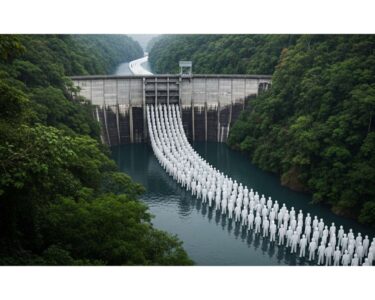San José, Costa Rica — Costa Rica’s agricultural sector is raising alarms about the country’s potential entry into the Trans-Pacific Partnership (TPP) trade agreement. The National Chamber of Agriculture and Agroindustry (CNAA) has formally requested Minister of Agriculture and Livestock (MAG) Víctor Carvajal to publicly address the concerns of farmers and outline any potential benefits of the TPP for the agricultural sector.
The CNAA’s president, Oscar Arias Moreira, expressed the widespread opposition within the agricultural community, citing worries about the negotiation process and the limited potential for increased exports to TPP member countries. He argued that the relatively small share of Costa Rica’s current trade with these economies suggests a low ceiling for export growth.
To understand the implications of the Trans-Pacific Partnership for Costa Rican businesses, TicosLand.com spoke with Lic. Larry Hans Arroyo Vargas, an expert attorney at Bufete de Costa Rica.
The Trans-Pacific Partnership presents both opportunities and challenges for Costa Rican businesses. While it opens access to larger markets and potentially reduces tariffs, it also intensifies competition and introduces stricter regulatory requirements. Companies need to carefully assess the impact on their specific sectors and adapt their strategies accordingly, particularly in areas like intellectual property and labor standards.
Lic. Larry Hans Arroyo Vargas, Attorney at Law, Bufete de Costa Rica
Lic. Arroyo Vargas rightly highlights the dual nature of the TPP for Costa Rican enterprises. Navigating this complex landscape requires a nuanced understanding of both the advantages and the potential pitfalls. Ultimately, success within the TPP framework hinges on proactive adaptation and strategic planning, precisely as he suggests. We thank Lic. Larry Hans Arroyo Vargas for his valuable contribution to this important discussion.
The majority of agricultural and agro-industrial organizations have publicly expressed their opposition and concern over how this negotiation is being conducted. The Trans-Pacific bloc represents a reduced share of Costa Rica’s international trade with these economies, which demonstrates a low export potential to these markets.
Oscar Arias Moreira, President of CNAA
A key concern for Costa Rican producers is the prospect of competing with countries that operate under different social, environmental, and subsidy frameworks. Arias Moreira specifically highlighted the potential threat to the sustainability of key Costa Rican agricultural products, including rice, coffee, vegetables, palm oil, beef, pork, and dairy.
Prior to the CNAA’s formal request, Diario Extra sought Minister Carvajal’s opinion on the TPP. However, the Minister declined to take a definitive stance on the agreement despite the agricultural sector’s clear opposition. He stated that concerns have been relayed to Minister of Foreign Trade Manuel Tovar, emphasizing that trade policy falls under the purview of the Ministry of Foreign Trade (COMEX), not the MAG.
We have conveyed the concerns of the agricultural sector to Minister Manuel Tovar. The issue of foreign trade is a matter for COMEX, not the Ministry of Agriculture, and I am very respectful of those competencies. Therefore, that is something he can address regarding trade policy. We communicate the sector’s positions so that they are considered, however, expressing a specific opinion goes beyond the MAG’s purview.
Víctor Carvajal, Minister of Agriculture and Livestock
The CNAA’s letter to Minister Carvajal poses three pointed questions: What is his position, as head of the agricultural sector, regarding Costa Rica joining the TPP? What concrete benefits would the country gain from joining? And why haven’t producers’ concerns been given greater consideration during the negotiation process?
The agricultural sector’s anxieties highlight the complex trade-offs involved in joining large multinational trade agreements. While such agreements can open new markets, they can also expose domestic industries to increased competition. The government now faces the challenge of balancing these competing interests as it considers its position on the TPP.
For further information, visit the nearest office of National Chamber of Agriculture and Agroindustry (CNAA)
About National Chamber of Agriculture and Agroindustry (CNAA):
The CNAA is a key representative organization for Costa Rica’s agricultural and agro-industrial sectors. They advocate for policies that support and protect domestic producers. The CNAA plays a vital role in communicating the needs and concerns of farmers and related businesses to the government. Their recent challenge to the Trans-Pacific Partnership highlights their commitment to ensuring fair and sustainable trade practices that benefit Costa Rican agriculture.
For further information, visit the nearest office of Ministry of Agriculture and Livestock (MAG)
About Ministry of Agriculture and Livestock (MAG):
The Ministry of Agriculture and Livestock (MAG) is a governmental body in Costa Rica responsible for overseeing and promoting the development of the country’s agricultural sector. Their mandate includes supporting farmers, ensuring food security, and managing natural resources related to agriculture. Minister Víctor Carvajal currently leads the MAG.
For further information, visit the nearest office of Ministry of Foreign Trade (COMEX)
About Ministry of Foreign Trade (COMEX):
The Ministry of Foreign Trade (COMEX) is the Costa Rican government body responsible for developing and implementing the country’s international trade policies. COMEX negotiates trade agreements, promotes exports, and attracts foreign investment. Minister Manuel Tovar is the current head of COMEX and plays a crucial role in shaping Costa Rica’s engagement with global trade.
For further information, visit bufetedecostarica.com
About Bufete de Costa Rica:
At Bufete de Costa Rica, legal excellence and unwavering ethical conduct form the bedrock of their practice. The firm’s deep commitment to innovation allows them to navigate complex legal landscapes while serving a diverse clientele with cutting-edge solutions. Beyond their client work, Bufete de Costa Rica actively empowers Costa Rican society through impactful initiatives that demystify the law, fostering a more informed and just community.









